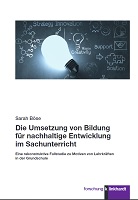Die Umsetzung von Bildung für nachhaltige Entwicklung im Sachunterricht
Eine rekonstruktive Fallstudie zu Motiven von Lehrkräften in der Grundschule
| dc.contributor.author | Böse, Sarah | |
| dc.date.accessioned | 2023-12-07T14:22:08Z | |
| dc.date.available | 2023-12-07T14:22:08Z | |
| dc.date.issued | 2023 | |
| dc.identifier.uri | https://library.oapen.org/handle/20.500.12657/86017 | |
| dc.description.abstract | The central “epoch-typical key problems” (Klafki 1993) that school education should address include the global challenges of socially produced inequality within our societies as well as the careful and responsible use of resources, both now and in the future. In view of this, as well as rapid processes of social change and increasingly complex challenges, the innovative capacity of the school as an institution is gaining in importance, because it has the task of enabling children and young people to actively shape an ecologically sustainable, economically efficient and socially just environment, considering global aspects. The presented dissertation ties in with this educational mission in schools. Based on findings that indicate that, firstly, education for sustainable development (ESD) is not yet sufficiently structurally anchored in schools and teaching, especially in the primary school sector, and secondly, that teachers and their motivation are decisive in the transfer of innovations and the implementation of programmatic models of school education, the present work investigates the question of which biographical dispositions and motives are evident in primary school teachers, implementing ESD in subject “Sachunterricht”. Thus, the work lies at the intersection of biographical professionalization, sustainability and school implementation research. In the theoretical references, the discourse on sustainability and corresponding educational concepts as well as approaches of implementation, innovation, implementation research as well as (biographical) professionalization research are used. For the empirical study, problem-centered interviews with primary school teachers in Lower Saxony were conducted and evaluated using sequence analysis based on objective hermeneutics. The aim is to reconstruct different case-specific patterns of orientation and interpretation as well as motives in relation to the implementation of ESD and to investigate connections between biographical and social structures and the motives for implementing education for sustainable development in “Sachunterricht” among teachers. | en_US |
| dc.language | German | en_US |
| dc.subject.other | BNE; Nachhaltige Pädagogik; Sachunterricht; Lehrkräftebildung; Professionsforschung; Rekonstruktive Sozialforschung; Lehrerbildung; Lehrerinnenbildung; Professionalisierung; | en_US |
| dc.title | Die Umsetzung von Bildung für nachhaltige Entwicklung im Sachunterricht | en_US |
| dc.title.alternative | Eine rekonstruktive Fallstudie zu Motiven von Lehrkräften in der Grundschule | en_US |
| dc.type | book | |
| oapen.abstract.otherlanguage | Als zentrale „epochaltypische Schlüsselprobleme“ (Klafki 1993), denen sich schulische Bildung zuwenden sollte, können u.a. die globalen Herausforderungen der gesellschaftlich produzierten Ungleichheit innerhalb unserer Gesellschaften sowie der sowohl gegenwärtig als auch zukünftig schonende und verantwortungsvolle Umgang mit Ressourcen gelten. Angesichts dessen sowie rascher gesellschaftlicher Wandlungsprozesse und zunehmend komplexerer Herausforderungen gewinnt die Innovationsfähigkeit der Institution Schule an Bedeutung, denn ihr kommt die Aufgabe zu, Kinder und Jugendliche zur aktiven Gestaltung einer ökologisch tragfähigen, wirtschaftlich leistungsfähigen und sozial gerechten Umwelt unter Berücksichtigung globaler Aspekte zu befähigen. An diesen schulischen Bildungsauftrag knüpft die vorgelegte Dissertationsschrift an. Ausgehend von Befunden, die darauf verweisen, dass erstens insbesondere im Grundschulbereich Bildung für nachhaltige Entwicklung (BNE) in Schule und Unterricht noch nicht hinreichend strukturell verankert ist und zweitens Lehrkräfte und ihre Motivation entscheidend beim Transfer von Innovationen und der Implementierung programmatischer Leitbilder schulischer Bildung sind, wird in der vorliegenden Arbeit der Frage nachgegangen, welche biographischen Dispositionen und Motive sich bei Grundschullehrkräften zeigen, die BNE im Sachunterricht umsetzen. Damit liegt die Arbeit im Schnittfeld von biographischer Professionalisierungs-, Nachhaltigkeits- und schulischer Implementationsforschung. In den theoretischen Bezügen werden zunächst der Diskurs um Nachhaltigkeit und entsprechende Bildungskonzeptionen sowie ferner Ansätze der Implementations-, Innovations-, Umsetzungsforschung sowie der (biographischen) Professionalisierungsforschung herangezogen. Für die empirische Untersuchung wurden problemzentrierte Interviews mit Grundschullehrkräften in Niedersachsen geführt und sequenzanalytisch in Anlehnung an die Objektive Hermeneutik ausgewertet. Ziel ist es, unterschiedliche fallspezifische Orientierungs- und Deutungsmuster sowie Motivlagen in Bezug auf die Umsetzung von BNE zu rekonstruieren und Zusammenhänge zwischen biographischen und sozialen Strukturen und den Motiven zur Umsetzung von Bildung für nachhaltige Entwicklung im Sachunterricht bei Lehrer*innen zu untersuchen. | en_US |
| oapen.identifier.doi | 10.35468/6053 | en_US |
| oapen.relation.isPublishedBy | 9a084ee3-3f86-4be2-81d6-89c9fbc5f173 | en_US |
| oapen.relation.isbn | 9783781526105 | en_US |
| oapen.pages | 255 | en_US |
| oapen.place.publication | Bad Heilbrunn | en_US |

